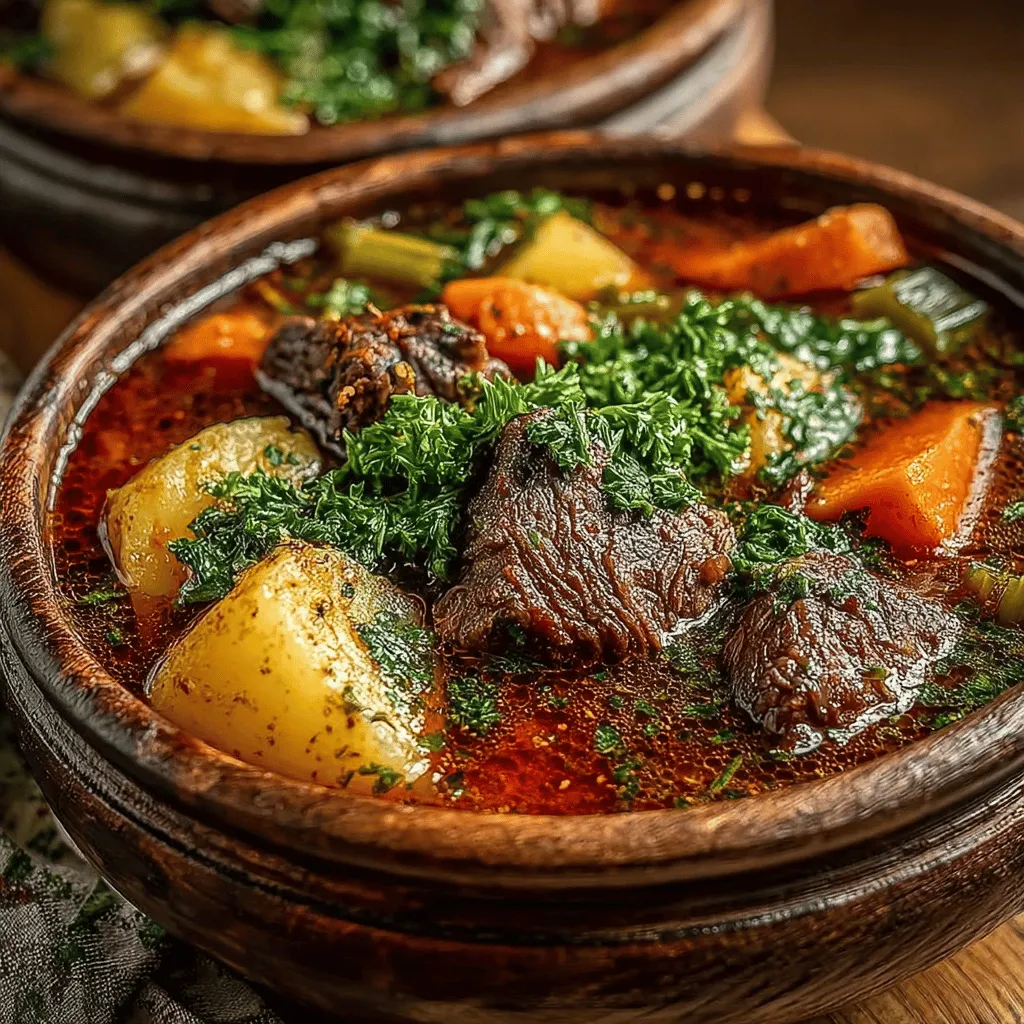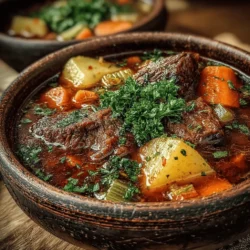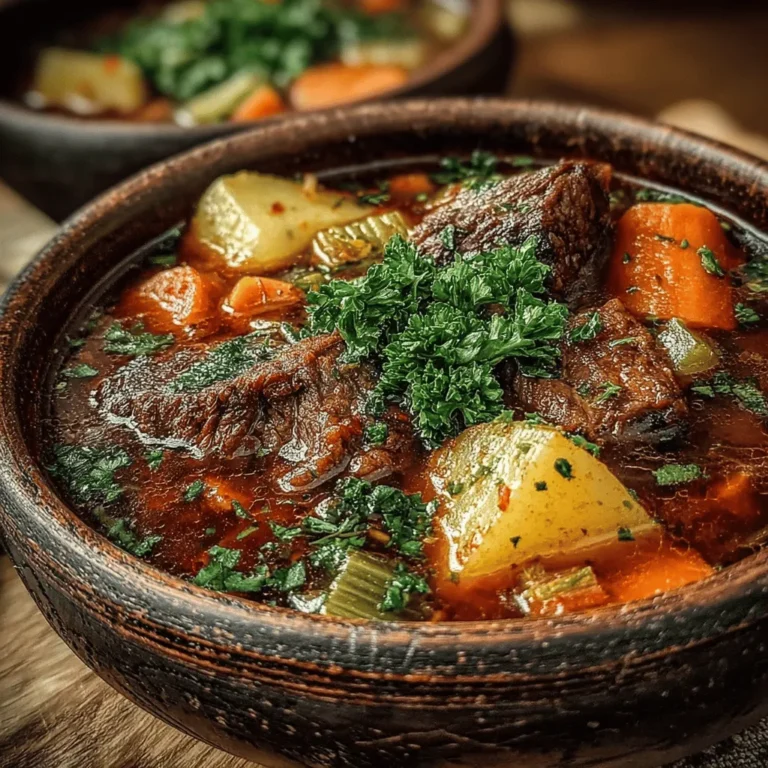When the cold weather rolls in, there’s nothing quite like a warm bowl of homemade soup to provide comfort and nourishment. This Comforting Hearty Beef and Vegetable Soup is the perfect solution for chilly nights or family gatherings. Packed with tender beef, fresh vegetables, and rich flavors, this recipe will warm your heart and fill your belly. Let’s dive into the ingredients and steps to create this delightful dish.
Ingredients
– 2 pounds beef chuck, cut into 1-inch cubes
– 2 tablespoons olive oil
– 1 large onion, diced
– 3 cloves garlic, minced
– 4 carrots, sliced
– 3 celery stalks, chopped
– 2 medium potatoes, diced
– 1 cup green beans, trimmed and cut into pieces
– 1 can (14.5 ounces) diced tomatoes, undrained
– 6 cups beef broth
– 1 teaspoon dried thyme
– 1 teaspoon dried rosemary
– Salt and pepper to taste
– Fresh parsley, chopped (for garnish)
Instructions
1. In a large pot or Dutch oven, heat the olive oil over medium-high heat. Add the beef cubes and brown them on all sides. This step is crucial as it enhances the depth of flavor in the soup.
2. Remove the browned beef from the pot and set aside. In the same pot, add the diced onion and sauté for about 5 minutes until softened. Stir in the minced garlic and cook for an additional minute, until fragrant.
3. Add the carrots, celery, and potatoes to the pot, stirring to combine. Cook for about 5 minutes, allowing the vegetables to begin softening.
4. Return the browned beef to the pot, along with the green beans, diced tomatoes, beef broth, thyme, rosemary, salt, and pepper. Bring the mixture to a boil.
5. Once boiling, reduce the heat to low and let the soup simmer for at least 1.5 to 2 hours. This slow cooking process allows the flavors to meld and the beef to become tender.
6. Taste the soup and adjust the seasoning if necessary. Serve hot, garnished with fresh parsley.
Understanding the Ingredients
Using quality ingredients is essential for creating a flavorful and nutritious soup. Each component plays a crucial role in enhancing the overall dish.
– Beef Chuck: This cut of beef is rich in protein and essential nutrients, making it a hearty base for the soup. The marbling in the chuck adds flavor and tenderness when cooked slowly.
– Vegetables: A variety of fresh vegetables contributes not only to the flavor but also to the nutritional value of the soup. Carrots provide beta-carotene, celery adds crunch and fiber, while potatoes and green beans bring texture and taste.
– Beef Broth: A good quality beef broth adds depth of flavor and hydration, making the soup more satisfying. Homemade broth is ideal but store-bought can work well too.
– Fresh Herbs and Spices: Using fresh herbs and spices elevates the soup’s flavor profile. Thyme and rosemary complement the beef beautifully, while salt and pepper enhance all the ingredients.
The Art of Simmering
Simmering is the secret to achieving the perfect texture and flavor in your soup. It allows the ingredients to release their flavors and meld together. The low and slow cooking technique ensures that the beef becomes tender and the vegetables maintain their integrity without becoming mushy.

The Importance of Simmering in Soup Making
Simmering is a crucial step in the soup-making process. It allows the ingredients to cook slowly, ensuring that the flavors meld together harmoniously. When you simmer your beef and vegetable soup, the gentle heat helps to break down the tough fibers in the meat, resulting in tender beef that practically melts in your mouth.
Optimal Simmering Timeframes
For the best texture and taste, a simmering time of at least 1.5 to 2 hours is recommended. This allows the beef to become tender and the vegetables to infuse their flavors into the broth. If you have the time, consider extending the simmering period to 3 hours, which deepens the flavor profile even further. Just be sure to check the soup periodically, as prolonged cooking can alter the texture of the vegetables.
Adjusting Flavors and Seasoning
Tasting and adjusting the seasoning throughout the cooking process is essential for achieving a well-balanced soup. As the soup cooks, flavors develop and intensify, making it vital to check for seasoning at various intervals.
Balancing Flavors
To create a harmonious flavor profile, consider the following tips:
– Salt: Start with a small amount and gradually add more as needed. Remember, you can always add salt, but you can’t take it away.
– Acidity: If using tomatoes, their acidity can brighten the dish. A splash of vinegar or a squeeze of lemon juice can also enhance the overall flavor.
– Herbs: Fresh herbs should be added at the end of cooking to maintain their vibrant flavor. Dried herbs can be added earlier in the process.
Customizing Your Soup
Feel free to personalize your soup based on your preferences. You can experiment with different vegetables, add grains like barley or rice, or spice it up with a touch of chili powder or paprika for heat. The possibilities are endless!
Serving Suggestions
When it comes to serving your hearty beef and vegetable soup, presentation matters. Here are some ideas to elevate your dining experience:
– Bread Pairings: Serve the soup with crusty bread or warm rolls to soak up the flavorful broth. Garlic bread or a classic baguette work wonderfully.
– Toppings: Consider garnishing with freshly chopped parsley or a sprinkle of grated Parmesan cheese for added flavor and visual appeal.
– Complementary Dishes: A simple side salad or a cheese platter can complement the soup nicely, making for a well-rounded meal.
Visual Appeal
The presentation of your soup can enhance the overall dining experience. A vibrant bowl of soup, garnished with fresh herbs and paired with colorful bread, will not only taste good but also look inviting.
Nutritional Information
Understanding the nutritional value of your hearty beef and vegetable soup can help you incorporate it into a balanced diet. A typical serving contains approximately:
– Calories: 300-400
– Protein: 25-30 grams
– Carbohydrates: 30-40 grams
– Fats: 10-15 grams
Dietary Variations
For those with dietary restrictions, this soup can be easily adapted. To make it gluten-free, simply use gluten-free soy sauce or omit any gluten-containing ingredients. For a low-carb option, reduce or eliminate starchy vegetables and consider substituting with leafy greens or cauliflower.
Conclusion
A bowl of hearty beef and vegetable soup is more than just a meal; it embodies warmth and comfort. The joy of cooking and sharing homemade meals with loved ones is a rewarding experience that brings people together. This nutritious and satisfying soup is perfect for chilly evenings or when you need a little extra comfort. Embrace the process of creating this dish and enjoy the delightful flavors it offers.


